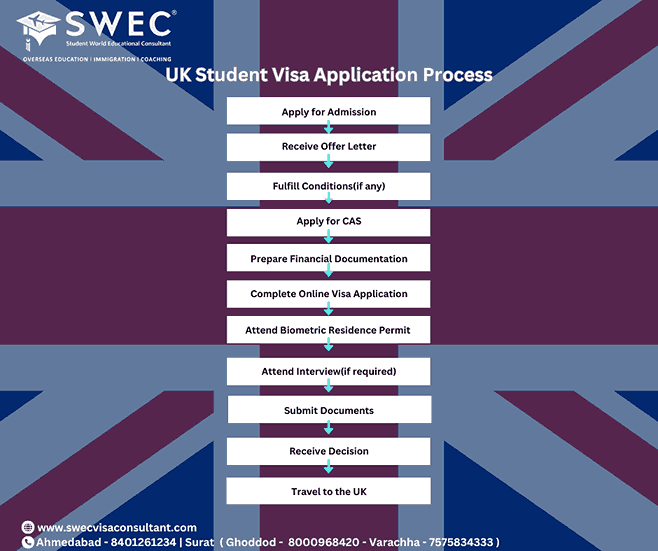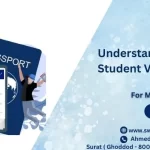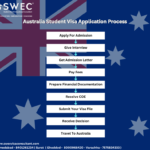Table of Contents
The United Kingdom has long been a top destination for international students, and Indian students make up a significant portion of that population. With its world-renowned universities, vibrant cities, and diverse culture, the UK offers an exceptional educational experience. This in-depth guide provides Indian students with all the necessary information to navigate the exciting journey of studying in the UK, from choosing the right program to securing a student visa.
Top Reasons to Study in the UK
- Prestigious Universities: The UK boasts some of the world’s leading universities, consistently ranking high in global university rankings. Institutions like Oxford, Cambridge, Imperial College London, and the London School of Economics and Political Science (LSE) are synonymous with academic excellence and offer a wide range of programs across various disciplines.
- Thriving Cities: From the historic charm of London to the cutting-edge innovation hubs like Manchester and Edinburgh, UK cities provide a dynamic and enriching environment for students. Explore world-class museums, vibrant nightlife scenes, and diverse cultural experiences, all within easy reach.
- Focus on Employability: UK universities emphasize practical skills and career preparation alongside academic rigor. Many programs offer internships and work placements, allowing you to gain valuable experience and build your network while studying.
- Language Advantage: English is the primary language of instruction, making the UK an ideal choice for Indian students who may already have a strong English foundation. This eliminates the need to learn a new language to pursue higher education.
- Diverse and Inclusive Environment: Universities in the UK are known for their multicultural student bodies. You’ll have the opportunity to connect with people from all over the world, fostering a global perspective and lifelong friendships.
- Post-Study Work Opportunities: With a UK degree, you’ll be well-positioned to secure employment opportunities in various sectors. The Graduate Route visa allows international graduates to stay in the UK for two years after completing their studies to seek work experience.
Expert Guidance for a Seamless UK Student Visa Application
Our experienced consultants have a deep understanding of UK visa requirements and procedures. We’ll provide clear guidance throughout the entire UK Student Visa Application process, ensuring you meet all eligibility criteria, gather the necessary documentation, and submit a flawless application.
Popular Degree Options for Indian Students
- Business: The UK is a global hub for business and finance. Programs in Management, Finance, Marketing, and Entrepreneurship are highly sought-after by Indian students.
- Engineering: UK universities are renowned for their engineering programs, offering specializations in fields like Mechanical Engineering, Computer Science, Electrical Engineering, and Aerospace Engineering.
- Law: The UK legal system is respected worldwide. Studying Law in the UK can open doors to careers in international law, corporate law, or human rights law.
- Social Sciences: Programs in Economics, Sociology, Psychology, and Political Science are popular choices for Indian students seeking a strong foundation in social sciences and humanities.
- Sciences: The UK is at the forefront of scientific research. Programs in Mathematics, Physics, Chemistry, Biology, and Environmental Sciences offer a chance to learn from leading academics and contribute to cutting-edge research.
Understanding the UK Higher Education System
The UK higher education system offers a variety of degree structures:
- Bachelor’s Degree: Typically a three-year undergraduate program leading to a Bachelor of Arts (BA) or Bachelor of Science (BSc) qualification.
- Master’s Degree: A one-year to two-year postgraduate program leading to a Master of Arts (MA), Master of Science (MSc), or Master of Business Administration (MBA) qualification.
- Ph.D.: This doctoral program is a research-based degree requiring three to four years of full-time study.
Finding the Right University
Choosing the right university is crucial for your academic success and overall experience in the UK. Here’s what to consider:
- Academic Reputation: Research the university’s ranking in your chosen field and its overall reputation for excellence.
- Program Offerings: Ensure the university offers the specific program and specialization you’re interested in.
- Location: Consider the type of city environment you prefer, whether it’s a bustling metropolis or a smaller, historic town.
- Cost of Attendance: Tuition fees and living expenses can vary significantly. Research costs to ensure the program aligns with your budget.
- Scholarships and Financial Aid: Explore scholarship opportunities offered by the university or external organizations. Many Indian students can benefit from scholarships to offset study costs.
Top Universities in the UK
The UK boasts some of the world’s most prestigious universities, offering a stimulating environment for academic pursuits and personal growth. Here are a few highly regarded institutions:
Avoid Costly Delays and Rejections with Our UK Student Visa Processing
Even minor errors on your visa application can lead to delays or rejections, costing you valuable time and money. Our meticulous review process minimizes the risk of mistakes during UK Student Visa Processing. We’ll identify potential issues, offer expert advice, and ensure your application is strong and ready for submission.
UK University Intake Periods
Universities in the UK typically have three main intake periods – January, May, and November. Some institutions might offer additional intakes throughout the year. It’s advisable to start your application process well in advance to allow for processing time and necessary arrangements.
Eligibility for Indian Students
- Academic Qualifications: Minimum 60% marks in Class 12 board exams.
- English Language Proficiency:
- IELTS: 6.0 – 6.5 overall scores (with minimum band scores as required by the university).
- TOEFL: Minimum score of 75 (specific score may vary by university).
- PTE Academic: 51 – 60 overall score.
- Work Experience: This may be required if there’s a gap in your education.
- Additional Documents:
- Letter of Recommendation (LOR)
- Statement of Purpose (SOP)
- Resume (if applicable)
Types of UK Student Visas for Indian Students
Choosing the right UK student visa depends on your age, program length, and course type. This table provides a clear breakdown to help you select the most suitable visa:
| Visa Type | Age Limit | Program Length | Course Type | Description |
| Short-term study visa | Up to 17 years old | Up to 11 months | Primarily English language courses | Ideal for short-term English language immersion programs or specialized short courses. |
| Tier 4 (Child) Student Visa | 4 to 17 years old | Full-time studies | Private school programs | For students attending private schools in the UK. |
| Tier 4 (General) Student Visa | 16 years old or above | Full-time studies (degree programs) | Undergraduate, postgraduate, and research degrees | The most common visa for Indian students pursuing higher education at universities or colleges in the UK. |
| Standard Visitor Visa (limited applicability) | All ages | Short courses (up to 6 months) | Training courses, short English language courses | In some cases, a Standard Visitor Visa may be an option for very short-term courses (less than 6 months). However, this visa type has limitations on work opportunities and time spent in the UK. It’s best to consult the UK Visas and Immigration (UKVI) website for the latest information on eligibility for a Standard Visitor Visa for short courses. |
Documents Required for UK Student Visa
- Valid Passport
- Offer Letter from your chosen university
- Financial Documents (proof of sufficient funds)
- Academic Transcripts
- English Language Test Results
- Health and Medical Documents
- Visa Application Forms
- Passport-sized Photographs
Save Time and Focus on Your Academic Goals with Our UK Student Visa Services
Focus on the exciting aspects of starting your studies in the UK! We’ll handle the complexities of the visa application on your behalf with our UK Student Visa Services. From managing paperwork to communicating with UKVI, we’ll take care of everything, allowing you to dedicate your valuable time to preparing for your academic journey.
The UK Student Visa Application Process
- UCAS Platform: Most universities utilise the University and Colleges Admissions Service (UCAS) for applications.
- Research and Selection: Research universities and programs aligned with your interests and career goals.
- UCAS Application: Create an account, complete the application form, and upload the necessary documents.
- Track Your Application: Use UCAS to track the status of your application.
- Financial Planning: Demonstrate sufficient funds to cover tuition and living expenses. Explore scholarships to offset costs.
UCAS Application Process
The University and Colleges Admissions Service (UCAS) manages applications to universities in the UK. Here’s a step-by-step guide:
- Choose Your University: Research universities and programs that align with your interests and career goals. Consider ranking platforms like QS or Times Higher Education for subject-specific rankings.
- Check Eligibility: Ensure you meet the specific requirements listed on the chosen university’s website for your desired program.
- Apply Through UCAS: Most universities use UCAS. Create an account, fill out the application form, and upload the necessary documents.
- Track Your Application: UCAS provides a platform to track your application status.
- Financial Planning: Demonstrate sufficient funds to cover tuition and living expenses. Explore scholarships to offset costs.
UK Student Visa Requirements for Indian Students
The application process for a UK Student Visa can be completed mostly online. Here are the essential documents you’ll need to gather:
- Confirmation of Acceptance for Studies (CAS): This official document from your chosen university confirms your place in the program and is vital for your visa application.
- Valid Passport: Ensure your passport has at least six months of validity beyond your intended study period.
- Proof of Funds: You’ll need to demonstrate sufficient financial resources to cover your tuition fees and living expenses for the duration of your studies. The required amount varies depending on your location (London is more expensive) but typically falls within the range of £10,207 to £12,006 per year for living expenses alone.
- English Language Test Results: You’ll need to provide proof of English language proficiency by taking an approved English language test like IELTS, TOEFL or PTE. The required score will vary depending on your program level.
- Biometric Information: During the visa application process, you’ll need to submit your fingerprints and a photograph at a designated visa application centre.
- Additional Documents: Depending on your specific circumstances, you might need to submit additional documents such as:
- Parental consent if you’re under 18 years old.
- Tuberculosis test results, if applicable.
- Written consent from your financial sponsor, if someone else is funding your studies.
Cost of Studying in the UK for Indian Students
- Tuition Fees: Undergraduate programs can cost anywhere between ₹14 lakhs to ₹35 lakhs per year, depending on the university and chosen course.
- Living Expenses: Costs vary depending on location (London vs. other cities). Here’s an estimated breakdown (in INR):
| Category | Cost (London) | Cost (Outer London) |
| Student Accommodation | 7,00,000 | 5,50,000 |
| Household Expenses (Wi-Fi, electricity etc.) | 1,40,000 | 80,000 |
| Groceries | 1,55,000 | 1,15,000 |
| Travel | 1,03,000 | 54,000 |
| Mobile Expenses | 18,000 | 18,000 |
| Socializing | 1,50,000 | 80,000 |
Additional Costs Associated with Studying in the UK
While tuition fees and living expenses are the primary costs, there are additional factors to consider:
- Visa Application Fee: The current fee for a UK student visa application from outside the UK is £348. If you’re already in the UK and applying to switch to a student visa, the fee is £490.
- Healthcare Surcharge: International students must pay an Immigration Health Surcharge (IHS) as part of their visa application. This surcharge covers your access to the National Health Service (NHS) during your studies. The cost varies depending on the length of your program.
- Travel and Health Insurance: While the NHS covers basic healthcare needs, consider purchasing additional private health insurance for a more comprehensive safety net. Factor in the cost of flights to and from India.
- Cost of Living: Apart from basic living expenses like rent, food, and utilities, include additional costs like travel within the UK, textbooks, and entertainment in your budget.
Peace of Mind Throughout Your UK Student Visa Process with Our Dedicated Support
The UK visa application process can be stressful. With our ongoing support through our UK Student Visa Services, you’ll have a dedicated team by your side. We’ll answer your questions promptly, address any concerns you have, and keep you updated on the status of your application every step of the way, ensuring a stress-free experience.
Scholarships for Indian Students
The UK offers several scholarships to Indian students, including:
- Chevening Scholarships: For students with leadership qualities and academic excellence. Covers tuition fees, living expenses, travel costs, and allowances.
- Commonwealth Scholarship: For students pursuing Master’s or PhD programs. Covers full tuition fees, living expenses, airfare, and other allowances.
- GREAT Scholarship India: Offers £10,000 towards tuition fees for postgraduate courses at specific UK universities.
- Charles Wallace India Trust Scholarships: Supports short-term research or professional visits to the UK in arts, heritage conservation, and humanities fields.
- Inlaks Scholarships: Provides tuition fees, living expenses, and travel allowance for students under 30 pursuing Master’s, M.Phil., or research degrees at top international universities (including some in the UK).
Additional Resources:
- Study in UK: https://www.gov.uk/browse/visas-immigration/student-visas
- ImmiAccount (Visa Application): https://www.gov.uk/browse/visas-immigration
Beyond Scholarships: Part-Time Work
To supplement scholarship funds or manage living expenses, Indian students on a valid visa can take up part-time work. You’re allowed to work 20 hours per week during term time and full-time during holidays.
The recent introduction of a 2-year post-study work visa by the UK government makes it an even more attractive destination for international students, allowing them to gain valuable work experience after graduation.
By exploring scholarships, part-time work options, and the extended post-study work visa, Indian students can make studying in the UK a more financially feasible and enriching experience.
Support for Indian Students in the UK
There are various resources available to support Indian students studying in the UK:
- University Support Services: Most universities offer dedicated international student support services to help you adjust to life in the UK, including academic guidance, visa advice, and social events.
- Indian High Commission in London: The Indian High Commission in London provides resources and support for Indian students in the UK, including welfare assistance and emergency contact information.
- Indian Student Associations: Many universities have active Indian student associations that organize social events and cultural activities, helping you connect with fellow Indian students and build a sense of community.
Tips for a Successful UK Student Visa Application from India
- Start Early: Don’t wait until the last minute to begin your visa application. The earlier you apply, the more time you have to address any potential issues. Aim to apply as soon as you receive your offer letter from the university.
- Meticulous Documentation: Ensure all your documents are complete, accurate, and translated into English if necessary. Double-check for any errors or missing information that could delay your application.
- Financial Requirements: Meet the financial requirements by demonstrating sufficient funds in your bank account or a sponsor’s account for at least 28 days before submitting your application.
- Prepare for the Visa Interview: While not everyone has a visa interview, it’s a good idea to be prepared. Be ready to answer questions about your study plans, funding sources, and future career aspirations. Speak confidently and clearly.
Proven Success Rate – Leverage Our Expertise with UK Student Visa Services
We have a proven track record of helping countless Indian students secure their UK student visas through our UK Student Visa Services. Our team’s expertise and experience can be your advantage! Read success stories from students who achieved their UK study dreams with our support, and see how we can help you achieve yours.
Conclusion
Studying in the UK can be an enriching and transformative experience for Indian students. With careful planning, thorough research, and the information provided in this comprehensive guide, you can successfully navigate the application process, secure your visa, and embark on a rewarding journey of academic exploration and personal growth in the UK. Contact us to get High Quality Service for your the UK Visa needs.
Frequently Asked Questions about UK Student Visa for Indian Students in 2024
Q1. How much does a UK Student visa cost?
The current application fee for a UK Student visa is £348. This may be subject to change, and there might be additional healthcare surcharge costs depending on the length of your program.
Q2. What are the Student visa requirements for the UK?
To qualify for a UK Student visa, you’ll typically need:
- An offer of acceptance from a recognized UK university (with a CAS – Confirmation of Acceptance for Studies).
- Proof of sufficient funds to cover tuition fees and living expenses for your entire study duration.
- Academic transcripts and qualifications.
- A valid passport.
- English language proficiency test results (usually IELTS or TOEFL).
- Tuberculosis (TB) test results (if required).
Q3. Is IELTS compulsory for a UK visa?
While some universities might have alternative English language requirements, in most cases, IELTS or a comparable test like TOEFL is mandatory for a UK Student visa.
Q4. What is the minimum bank balance for a UK visa?
The minimum required funds depend on your university’s location and program length. You’ll need to show enough to cover tuition fees and living expenses for the entire duration of your studies.
Q5. Is a 3-month bank statement enough for a UK visa?
A 3-month bank statement is usually not sufficient. The UK Visas and Immigration (UKVI) often recommend providing 28 consecutive days of bank statements reflecting funds to cover your tuition fees and living expenses.
Q6. Is the UK very expensive for students?
The cost of living in the UK varies depending on your lifestyle and chosen city. London is generally more expensive than other regions. Research tuition fees, living expenses (including rent, food, and transportation), and scholarship opportunities to plan your finances effectively.
Q7. How much can a student earn in the UK per month?
There are limits on how much you can earn as a student visa holder. Current regulations allow part-time work for up to 20 hours per week during term time and full-time work during vacations. The actual amount you earn depends on the job and your working hours.
Q8. Can I earn money in the UK as a student?
Yes, you can work part-time with a valid Student visa.
Q9. Is getting a UK student visa easy?
The application process can be straightforward if you meet the eligibility criteria and submit a well-prepared application with all the required documentation. Planning, meeting deadlines, and ensuring accuracy are crucial for success.
Q10. Which intake is best for the UK?
The “best” intake depends on your program and university. Many universities offer intakes in September (fall semester) and January (spring semester). Research your chosen program’s specific deadlines and application cycles.
Q11. What if my CAS is rejected?
Unfortunately, if your CAS is rejected, you cannot proceed with the visa application. Contact the university to understand the reasons for rejection and explore possible next steps.
Q12. What is the full form of CAS?
CAS stands for Confirmation of Acceptance for Studies. It’s an electronic document issued by your university confirming your offer of admission and program details, which is a crucial part of your visa application.
Q13. What is the food cost in the UK?
Food costs vary depending on your dietary needs and shopping habits. You can expect to spend roughly £150-£250 per month on groceries if you cook at home. Eating out regularly will increase your food expenses significantly.
Q14. How much is rent in the UK per month?
Rent varies greatly depending on the city, type of accommodation, and amenities. Research average rental costs for your chosen university location.
Q15. How many years can a student stay in the UK?
The duration of your stay depends on the validity period of your Student visa, which typically aligns with the length of your study program. You might be eligible to apply for extensions or switch to a different visa category depending on your circumstances.
Q16. How to get PR in the UK?
The path to Permanent Residency (PR) in the UK typically involves living and working legally in the country for a specific period under a relevant visa category. Requirements and procedures can change, so research the latest UK immigration regulations for the
Q17. How much is the gap acceptable for study in the UK?
There isn’t a strict limit on the acceptable gap between your studies and applying for a UK Student visa. However, UKVI may request justification for a longer gap (over 5 years). Be prepared to explain how the gap relates to your academic progression or career goals.
Q18. What are the new rules for the UK Student Visa 2024?
A significant change introduced in January 2024 is that students enrolling in postgraduate research programs are the only ones who can bring their dependents (partners and children under 18) with them on a Student visa. Students in other programs cannot apply for their dependents to join them in the UK unless they qualify for a different visa category.
Q19. What is the age limit for a UK student visa?
There’s no strict upper age limit for a UK Student visa. However, you must be genuinely enrolled in a full-time registered study program at a recognized university and demonstrate that your studies align with your long-term goals.
Q20. Can I show my parents’ bank statement for a UK visa application?
Yes, you can use your parents’ bank statement as proof of funds for your UK Student visa application. However, you’ll also need to submit a sponsor letter from your parents. This letter should explain their relationship to you and their commitment to financially supporting your studies in the UK.
Q21. Can I show a Fixed Deposit (FD) as proof of funds?
Yes, Fixed Deposits can be considered as proof of funds, but they might need to be readily accessible to meet visa requirements. Check with your bank if there are any restrictions on withdrawing funds from your FD.
Q22. Does the UK Embassy verify my bank balance?
Yes, UKVI may verify your bank statements and financial documents to ensure you have sufficient funds to support yourself during your studies.






